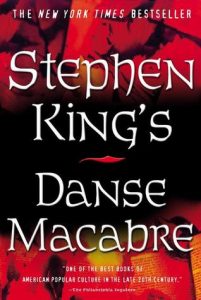The Stephen King Project – Danse Macabre (1981)
About the project
I will be reading all of Stephen King’s books in order of publication (with the exception of The Dark Tower series which I will read together, at the end of this adventure) and writing a review of each. I’ll be looking at the recurring themes, the tricks he likes to use, the way he develops character and the way that his craft has evolved in the 44 years since Carrie was first published.
With Danse Macabre we come to the first of Stephen King’s non-fiction books that I will be reading during this project. I remember first reading it when I was in my very early twenties (maybe twenty or twenty-one) and I loved it then. I loved the autobiographical sections as much as the study of the horror genre and on discovering that this man, this hero of mine, loved any of the same books that I did, well it made me feel accepted, I suppose. That it didn’t matter so much if I was a geek because so was Stephen King and he was successful and charming as well.
So, I came back to the book with a little trepidation. How had it held up over the years? Would I still enjoy it as much as I had back then?
 If there’s one thing that you should take away from this book, it’s the knowledge that Stephen King is a champion of the genre. This is not a man who writes horror because he wants to shock people or because he thought it would be popular and make him rich. This is a man who has had a lifelong love affair with horror. It was perhaps inevitable that when he turned his hand to writing, it was horror that would claim him.
If there’s one thing that you should take away from this book, it’s the knowledge that Stephen King is a champion of the genre. This is not a man who writes horror because he wants to shock people or because he thought it would be popular and make him rich. This is a man who has had a lifelong love affair with horror. It was perhaps inevitable that when he turned his hand to writing, it was horror that would claim him.
Danse Macabre came about as the result of urging from his friend and editor, Bill Thompson. Although King was initially reluctant to take on such a project, he changed his mind when he realised that much of the material he was teaching at the time would form the backbone of the book.
Danse Macabre takes us through horror radio, television, films and books from around 1950 to 1980. Obviously, it would be impossible to cover every release for thirty years, so King chooses the pieces that he considers especially important.
Almost 40 years later, some of the material is a little dated. Readers my age, for example, will have little knowledge of the old radio plays and may find that chapter a little dull – although I was intrigued and happy enough to read King’s discussion of this art form that I will never truly experience.
Film has come a long way since the 1950s and while I certainly still enjoy many older films (Arsenic and Old Lace, anyone?) I suspect that horror films are less likely to have aged well. That trick of being able to suspend disbelief is so much harder when you can see the zip running up the back of the monster suit. Despite that, King’s discussion of classic (and awful) horror films from before I was born made me want to hunt some of them down and spend a bit of time immersed in those early examples.
The TV shows covered in Danse Macabre would likely be harder to track down copies of nowadays and I imagine they would suffer at least as much from the changes in filming abilities and acting conventions as films.
The real meat of the book, for me, was the discussion of King’s top horror books. Classics such as Frankenstein and Dracula, as well as more modern classics like The Haunting of Hill House and The Invasion of the Body Snatchers.
A warning here – King delves deep into his analysis of these stories and as such, Danse Macabre is full of spoilers. There may be sections you’ll want to skip until you’ve had a chance to read the text under discussion.
King’s analysis is keen and intelligent, a scalpel wielded by someone who loves the texts he is discussing. Littered with autobiographical stories about how these texts became a part of his own life as well as discussion with the authors and extracts from interviews with them, this is a great read.
I came away from my time with Danse Macabre with a renewed love for horror and a desire to branch out from my current fantasy writing and add some horror into the mix. And of course, my TBR list has grown again…
While this text may be a little more than the casual reader requires, for any long-term fans of either King or the genre as a whole, this book is well worth the time it takes to read. Now, if only he would write an updated version. I would love so much to read his thoughts on some of the formative horror from my youth up to the present day.
Next up is Cujo, one of the books that really blew my mind as a young reader. How can you take something so simple and turn it into a novel – and a brilliant novel, at that. As much as I loved this book the first time around, I’m actually dreading it a little for this read-through. As a mother now, I think it’ll be even harder to read. Wish me luck!
